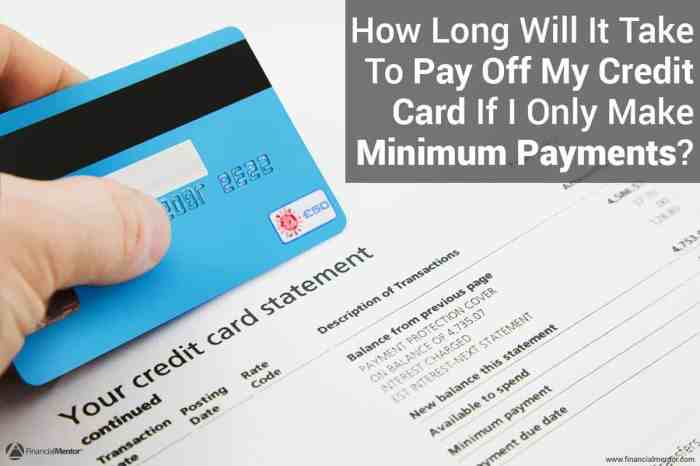Get ready to dive into the world of credit card minimum payment calculation. It’s not just about numbers; it’s about understanding the financial dance between you and your credit card company. So, buckle up and let’s explore this crucial aspect of managing your money!
In this article, we will unravel the mysteries surrounding credit card minimum payments, from why they matter to how they can impact your financial well-being.
Importance of Credit Card Minimum Payment Calculation
Understanding how to calculate the minimum payment on a credit card is crucial for financial health. By knowing the minimum payment amount, individuals can better manage their debt and avoid unnecessary fees and penalties.
Impact on Interest Accumulation and Debt Repayment
The minimum payment on a credit card significantly affects interest accumulation and debt repayment. When only the minimum payment is made each month, the remaining balance accrues interest, leading to a cycle of debt that can be difficult to break. Over time, this can result in paying much more in interest than the original debt amount.
- Making only the minimum payment prolongs the time it takes to pay off the debt, resulting in higher overall interest payments.
- Higher interest rates on credit cards can quickly accumulate, making it harder to get out of debt and achieve financial goals.
- By calculating the minimum payment accurately and paying more than the minimum each month, individuals can save money on interest and pay off their debt faster.
Factors Affecting Credit Card Minimum Payments
When it comes to calculating minimum payments on credit cards, several key factors come into play. Understanding these factors can help cardholders manage their finances more effectively.
Interest Rates
Interest rates significantly impact the minimum payment amount on a credit card. The higher the interest rate, the more a cardholder will need to pay to cover the interest charges. A lower interest rate can result in a lower minimum payment requirement.
Outstanding Balance
The total amount owed on a credit card, known as the outstanding balance, also plays a crucial role in determining the minimum payment. The higher the outstanding balance, the higher the minimum payment will be. Cardholders with large balances may face higher minimum payment requirements.
Credit Card Terms
Different credit card companies may have varying terms and conditions that influence how they calculate minimum payments. Some companies may use a percentage of the outstanding balance, while others may have a fixed minimum payment amount. Understanding the specific terms of your credit card agreement is essential in predicting and managing minimum payments effectively.
Methods of Credit Card Minimum Payment Calculation

When it comes to calculating the minimum payment on a credit card, there are specific steps and formulas used by credit card issuers to determine the amount owed. Understanding these methods can help you manage your credit card debt effectively.
Step-by-Step Calculation
To calculate the minimum payment on a credit card, follow these steps:
- Determine your total outstanding balance on the credit card.
- Check the terms and conditions of your credit card issuer to find the minimum payment percentage required.
- Multiply your outstanding balance by the minimum payment percentage to get the minimum payment amount.
Formulas Used by Credit Card Issuers
Credit card issuers use different formulas or algorithms to determine the minimum payment amount. One common formula is to set the minimum payment as a percentage of the outstanding balance, typically around 1-3%. Some issuers may also include interest charges and fees in the calculation.
Examples of Minimum Payment Calculations
| Scenario | Outstanding Balance | Minimum Payment Percentage | Minimum Payment Amount |
|---|---|---|---|
| Scenario 1 | $1,000 | 2% | $20 |
| Scenario 2 | $2,500 | 3% | $75 |
| Scenario 3 | $500 | 1.5% | $7.50 |
Impact of Making Only Minimum Payments
When you consistently make only the minimum payment on your credit card, it can have serious long-term consequences on your financial health. While it may seem convenient in the short term, it can lead to a cycle of debt that becomes increasingly difficult to break free from.
Increased Interest Charges
Making only the minimum payment means you are carrying a balance forward each month, resulting in the accumulation of interest charges. Over time, these interest charges can add up significantly, making it harder to pay off the balance.
Extended Repayment Period
By only paying the minimum amount due, you are prolonging the time it takes to pay off your credit card debt. This means you will be stuck in debt for a longer period, potentially years, and end up paying much more than the original amount you borrowed.
Negative Impact on Credit Score
Consistently making minimum payments can also have a negative impact on your credit score. Credit bureaus consider your credit utilization ratio, which is the amount of credit you are using compared to your total available credit. By carrying a high balance and making only minimum payments, you are increasing your credit utilization ratio, which can lower your credit score.
Strategies to Avoid the Minimum Payment Trap
To avoid falling into the minimum payment trap, consider these strategies:
- Avoid using your credit card for unnecessary purchases.
- Create a budget and prioritize paying off your credit card debt.
- Pay more than the minimum amount due whenever possible to reduce interest charges.
- Consider transferring your balance to a card with a lower interest rate or a balance transfer offer.
Accelerating Debt Repayment
If you are already in the cycle of making minimum payments, there are ways to accelerate debt repayment:
- Allocate any extra funds or windfalls towards paying off your credit card debt.
- Consider a debt repayment plan, such as the snowball or avalanche method, to prioritize paying off high-interest debt first.
- Seek assistance from a credit counselor or financial advisor for personalized guidance on debt repayment strategies.